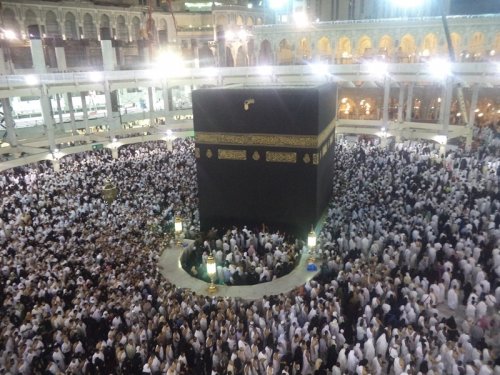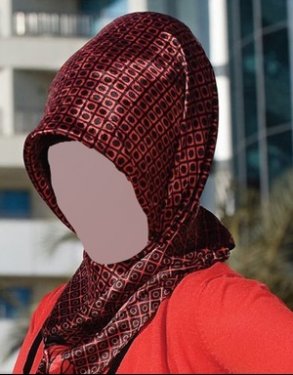-
Posts
8,434 -
Joined
-
Days Won
771
Content Type
Profiles
Forums
Events
Everything posted by ummtaalib
-
Isra & Meraj in Detail Mer'aaj and Isra: The Muarrikheen(historians) have differed greatly with regard to the date of Me'raj(Ascension). Hafiz ibn Hajar(Rahmatullahi alaiyh) has quoted more than ten different dates which the Ulema and historians have regarded as the possible date of Me'raj.(refer Fathul-Baree Vol.6 Page 203). As for its exact date, it is still controversial and no common consent has been reached. However, the majority of jurists are in favour of a date between 16-12 months prior to the migration to Madinah. ISRAA (NIGHT JOURNEY): refers to the journey of the Messenger of Allah (Peace and blessings be upon him) from the Sacred Mosque(Masjidul Haram) in Makkah to the Distant Mosque(Masjidul Aqsa) in Jerusalem on Al-Buraq in the company of Gabriel(Jibraeel-alaiyhis salaam). MI' RAJ (ASCENSION): Refers to what happened to the Prophet(Peace and blessings be upon him) when he ascended from al-Masjid al-Aqsa in Jerusalem up to beyond the Seventh Heaven, where Salaat(prayer) was prescribed, and then returning back in the same fashion in the same night. Courtesy: www.everymuslim.net
-
Wearing the Pants above the Ankles Once Suhail bin Hanzalah (Radhiallahu Anhu) mentioned: “On one occasion Rasulullah (Sallallahu Alaihi Wasallam) made mention of Hadhrat Khuraim Asadi (Radhiallahu Anhu) and said, “He is a good man except for two habits, viz. he keeps the hair of his head too long and he allows his izaar (lower garment) to go below his ankles. When Khuraim learnt of this, he immediately cut his hair up to his ears and began to keep his izaar up to the middle of the calf of his leg.” (Fazaail Aamaal) يَا رَبِّ صَلِّ وَ سَلِّمْ دَائِمًا أَبَدًا عَلَى حَبِيبِكَ خَيرِ الخَلْقِ كُلِّهِمِ
-
An Interview with Umm Saalih A Grandmother Who Completed Memorizing the Qur'an at Eighty-Two Years Old As Read by Dr. Saleh as Saleh Al-Hamdulillaah (All-Praise is due to Allah), the One Who said (what means): "And in truth We have made the Qur'aan easy to remember; but is there any that remembers?" Surah 54: 32 Many all over the world memorize the Qur'aan, and it is not strange to see the youth memorizing the Noble Qur'aan and an early age. Al-Hamdulillaah, the One who made the Qur'aan easy for remembrance, had made it easy for Umm Saalih age 82. In an interview with Umm Saalih, she was asked the following questions: Q1: "What was the reason that drove you to memorize the Qur'aan after so many years?" She said, "I always hoped to memorize the Qur'aan from the time I was young. My father always used to invoke Allaah for me to become one of the memorizers of the Qur'aan, like himself and like the elder brothers of my family who memorized it. So I memorized in the beginning about three parts and then after I completed the age of thirteen, I got married and became busy with the household and the children. After I had seven children, my husband died. They (the children) were all young so I took the time to raise them and educate them, and then after they grew up and got married, I had more time for myself. Therefore, the first thing I directed myself to focus upon was the Qur'aan. Q2: "Tell us about your journey with the Noble Qur'aan." She said, "My younger daughter was going to high school and she was the closest of my children to me and the most beloved, because she stayed with me after her older sisters got married and got busy with their lives, and because she was a quiet girl, upright, loving, and good. In addition, she was interested in learning the Noble Qur'aan, and her teachers encouraged her. Furthermore, she was very enthusiastic and always told me of many women who were driven by this great motivation to memorize the Qur'aan, and this is where I started." Q3: "Tell me about your way of memorization." She said, "We assigned ten verses (meaning her and her daughter who was going to high school). So each day after Asr, we used to sit together. She reads and I repeat after her three times. Then she explains the meaning to me, and after a while, she repeats that three times. On the next morning, she repeats them to me before she goes to school. She recorded also the recitations of Ash Shaykh al Husary, Rahimuhullaah, repeating each verse three times and thus I continued to listen most of the time. Therefore, the next day we would go to the next ten verses if my memorization was good. Otherwise, we would postpone taking additional verses until the day after. Moreover, we assigned the day of Friday to review the memorizations of the entire week. And this was the journey from the beginning." Then she said, "Over four years and a half, I memorized twelve juz" according to the way I described to you. Then this young daughter got married. When her husband knew of our task concerning the memorization, he rented a house close to me, close to my house, so that he could allow the continuation of the memorization. In addition, he, May Allah reward him used to encourage us and sometimes sit with us listening, explaining and teaching. Then after three years of her marriage, my daughter got busy with the children and the household and our schedule was interrupted, but that did not make her give up. To the contrary, she sensed that my eagerness for the memorization was still established so she looked for a special good teacher to continue the journey under her supervision. So, I completed the memorization by the success of Allaah and my daughter is still working to finish the memorization of the Glorious Qur'aan. She has a little left, In Shaa Allaah Ta'aala. Q4: "This motivation of yours, did it have an effect on other women around you?" She said, "It really had a good strong effect. My daughters and stepdaughters were all encouraged and worked on learning and teaching the Qur'aan to their children and learning it themselves. Q5: "After finishing the Noble Qur'aan, don't you think about working on memorizing hadith?" She said, "Now I have memorized ninety hadith and In Shaa Allaah I will continue the journey. I depend, in my memorization, upon the tapes and upon the Qur'aan radio station. At the end of each week, my daughter comes and checks for me the memorization of three hadith, and I am trying now to memorize more. Q6: "Over this period of memorization of the Qur'aan, did your life change? Was it affected in one way or another?" She said, "Yes, I went through a major change and I tried always, all praise is due to Allaah, to obey Allaah before I started the memorization. However, after I started the task of memorization, I began to feel a self-comfort, a great self-comfort and all worries began to move away from me. I even reached the stage of freeing myself from all these excessive worries concerning fearing for the children and their affairs, and my morale was boosted. I had a noble objective to work for and this is a great Ni'mah (Favor) from Allaah . upon me, since we know that some women, when they get old and they do not have a husband, and their children got married, may be destroyed by the empty time, thoughts, worries, and so forth. But, AlHamdulillaah, I didn't go through this and I made myself busy with a great task and a great objective. Q7: "Didn't you think at one point, to join one of the circles focusing on teaching the Noble Qur'aan?" The answer was, "Yes, some of the women suggested this to me, but I am a woman who got used to staying at home, and I don't like to go out everyday, and Al Hamdulillaah, my daughter sufficed me from all difficulty and I was so happy while I was learning from her. My daughter had set an example in goodness and righteousness which we rarely find in our days. She started this task and journey with me while she was an adolescent and this is a critical age many people complain of. She used to pressure herself so that she could have spare time to teach me, and she used to teach me with kindness and wisdom. Her husband was a good help to her and he exerted a lot of effort. I ask Allaah . to give them success and to bring their children up on uprightness." Q8: "What do you say to a woman of your age who wishes to learn and memorize the Qur'aan yet she is worried about it and feeling unable to?" She said, "I say to her there their shall be no despair with the firm, sincere and truthful determination. Begin with sincerity, firm determination and dependence on Allaah at each time. And remember that at this age you should have the time for yourself. However, do not use your time to only go out or to sleep and so forth. Rather, busy yourself with righteous work. Q9: "Now what would you say to a woman who is still young? What would you advise her?" She, may Allaah preserve her, said: "Preserve Allaah and He will preserve you. Make use of the favor of Allaah bestowed upon you from health and ways and means of comfort. Use that to memorize the Book of Allaah. This is the light which enlivens your heart, your life and your grave after you die. And if you have a mother then exert the effort to teach her, and there is no better favor upon a mother than one of her righteous children aiding her to be close to Allaah." Presented on the 1st of Muharram 1426, Feb 10th 2005. Originally published in Ad-Da'wah Magazine, no.1552, 17th of Rabee' Al-Awwal 1417,corresponding to Aug 1, 1996.
-
I think Haya wants us to mention if it would against haya (modesty) to use one's real name I think it would be.
-
-
hmmm security purposes...that would go for even the males I once read (or heard in a speech) that The Qur'an does not mention the names of any woman except Maryam AS, the mother of 'Eesa AS. The names of other women are alluded to and we learn the names from the hadith.....sooo if we can get an answer to this from an authentic source then we'll have our answer
-
Saudis retrace route of Abraha’s army that came to destroy Kaaba Thursday 9 October 2014 A group of young Saudi history enthusiasts has retraced the path of the People of the Elephant who tried to destroy the Holy Kaaba centuries ago. The Holy Qur’an, in a short chapter, briefly refers to the story of the army of elephants led by Abraha Al-Ashram, who was a governor of Yemen. God destroyed Abraha and his army that included 13 elephants, by sending flocks of birds that dropped small stones on them. “There never fell a stone on a soldier except it dissolved his flesh and burst it into pieces … Abraha Al-Ashram fled while his flesh was bursting into pieces and died on the way back to Yemen,” said the 14th century scholar Ibn Kathir, an authentic Qur’an commentator. During their tiring journey across mountains and rough terrain, the young Saudi men took photographs of important landmarks, beginning from north of Najran, to the east of Asir, and then east of Baha. Some of the most important historical sites along the way included inscriptions of elephants on rocks in the Al-Qahr Mountain, southeast of Tathlith; an old well in Hafaer, east of Asir; and a paved road near Kara in Aqeeq principality in the Baha region. Mohammed Al-Amry, head of the geology department at King Saud University, said he had seen the path of Abraha and his army in Tathlith and Baha. “The army had passed the Arabian shield region comprising rocks and there were writings in the Humairiya language on some mountains,” he said. According to historical Islamic sources, Abraha, who was a Christian, had thought of building a church similar to the Kaaba in Sanaa. He wanted the Arabs to perform the pilgrimage in Sanaa instead of Makkah, with the intention of diverting trade and benefits to Yemen. He presented the idea to the then king of Ethiopia who agreed to it. Abraha built the church but the Arabs refused to come for pilgrimage in Sanaa. This infuriated him, prompting him to form an army to invade Makkah and demolish the Kaaba. He defeated all Arab armies on the way until he reached Makkah where he was attacked by the flocks of birds sent by the Almighty. arabnews
-
The Event of the Elephant took place in the month of Al-Muharram, fifty or fifty five days before the birth of Prophet Muhammad (Peace be upon him) which corresponded to late February or early March 571 A.D Abraha As-Sabah Al-Habashi, the Abyssinian (Ethiopian) viceroy in Yemen. He had seen that the Arabs made their pilgrimage to Al-Ka‘bah so he built a large church in San‘a in order to attract the Arab pilgrims to it to the exclusion of Makkah. A man from Kinana tribe understood this move, therefore he entered the church stealthily at night and besmeared its front wall with excrement. When Abraha knew of that, he got very angry and led a great army - of sixty thousand warriors - to demolish Al-Ka‘bah. He chose the biggest elephant for himself. His army included nine or thirteen elephants. He continued marching until he reached a place called Al-Magmas. There, he mobilized his army, prepared his elephants and got ready to enter Makkah. When he reached Muhassar Valley, between Muzdalifah and Mina, the elephant knelt down and refused to go forward. Whenever they directed it northwards, southwards or eastwards, the elephant moved quickly but when directed westwards towards Al-Ka‘bah, it knelt down. Meanwhile, Allâh loosed upon them birds in flights, hurling against them stones of baked clay and made them like green blades devoured. These birds were very much like swallows and sparrows, each carrying three stones; one in its peak and two in its claws. The stones hit Abraha’s men and cut their limbs and killed them. A large number of Abraha’s soldiers were killed in this way and the others fled at random and died everywhere. Abraha himself had an infection that had his fingertips amputated. When he reached San‘a he was in a miserable state and died soon after. The Quraishites on their part had fled for their lives to the hillocks and mountain tops. When the enemy had been thus routed, they returned home safely. [ibn Hisham 1/43-56; Tafheemul-Qur’an 6/462-469] Source: Ar-Raheeq Al-Makhtum The Sealed Nectar, biography of the Noble Prophet (SAW) by Safi-ur-Rahman Al-Mubarakpuri See more here: The Story of the People of the Elephant
-
Bismi Allahi alr-Rahmani alr-Rahimi In the Name of Allah, the Most Gracious, the Most Merciful. 1. ''Alam tara kayfa fa-'ala Rabbuka bi-"as-habi al-fili Have you (O Muhammad صلى الله عليه وسلم not seen how your Lord dealt with the Owners of the Elephant? [The elephant army which came from Yemen under the command of Abrahah Al-Ashram intending to destroy the Ka'bah at Makkah]. 2. ''Alam yaj-'al kaydahum fi tadlilin Did He not make their plot go astray? 3. Wa-''arsala 'alayhim tayran "ababila And sent against them birds, in flocks, 4. Tarmihim bi-hijaratinm min sijjilin Striking them with stones of Sijjil (baked clay). 5. Faja-'alahum ka'asfinm ma" kulin And He made them like (an empty field of) stalks (of which the corn has been eaten up by cattle). Source
-
This is regarding a hadith found on many sites online (without mention of a source) concerning the various punishments for women in the fire of Jahannam. The correct answer is given by Moulana Muhammad Abasoomar of Hadithanswers.com The hadith in question (On some sites there are up to ten points mentioned) Answer ‘Allamah Ibn Hajar Al Haytami (rahimahullah) has quoted this narration in his ‘Az Zawajir ‘An Iqtirafil Kabair’ without a chain of narrators (sanad). (Az Zawajir, Vol. 2 pg. 79) It is not permissible to quote a narration until its authenticity can be verified. Since the above narration is cited without a chain of narrators it cannot be verified. The above narration therefore is not suitable to quote, especially since it exaggerates the punishments for the mentioned sins. Such exaggeration is usually found in fabrications. (See: Tadribur Rawi) Another reason for the above ruling, is that some contemporaries have also claimed to have located this narration in the books of the Shi’ah. Cautionary note: The above narration is also found in some unreliable editions of Hafiz Dhahabi’s Al Kabair. This narration is not found in the reliable editions of Al Kabair. (Refer: Al Kabair of Hafiz Dhahabi, edition of Muhyud Din Mustu) And Allah Ta’ala Knows best Verified by: Moulana Muhammad Abasoomar hadithanswers.com
-
I cannot find an answer to your question on any of the Q/A sites or anywhere else. Perhaps its best to ask a scholar because I would just be giving you my own opinion based on a couple of things I've read or heard in speeches.
-

Warnings of Punishment for Women in The Qur'an & Hadith
ummtaalib replied to ummtaalib's topic in For the Muslimah
Asking for Divorce for no Apparent Reason It has been narrated by Hazrat Thawbaan radiyallahu anhu, " The fragrance of Jannat is unlawful upon that woman who asks her husband for a divorce for no apparent reason." (Imaam Ahmed, Abu Dawud, Tirmidhi, Ibn Maajah and Haakim) -

Warnings of Punishment for Women in The Qur'an & Hadith
ummtaalib replied to ummtaalib's topic in For the Muslimah
Camel Hump Hijaab Style The Prophet sallallaahu 'alayhi wasallam said, “There are two types of the people of Hell that I have never seen: people with whips like the tails of cattle, with which they strike people, and women who are dressed but appear naked, walking with an enticing gait, with their heads looking like the humps of camels leaning to one side. They will never enter Paradise, nor even smell its fragrance, although its fragrance can be discerned from such and such a distance.” [Muslim] -

Warnings of Punishment for Women in The Qur'an & Hadith
ummtaalib replied to ummtaalib's topic in For the Muslimah
Wearing Perfume in Public The Prophet sallallahu alaihe wasallam has stated, "If a woman was to apply perfume to herself, then leave her home and wander past people who were to catch her fragrance, she would be sinful of adultery and she would also be sinful of adultery for every glance she received." (Ahmad, Nasai and Al-Haakim:Abu Moosa Al-Ashari) Reported by Abu Dawud and At-Tirmidhi with the following wording: “Every eye is liable to commit adultery; and the woman who wears perfume and then passes by a gathering is such and such.” (i.e., she is an adulteress). At-Tirmidhi regarded the same hadith as an authentic hadith. -

Warnings of Punishment for Women in The Qur'an & Hadith
ummtaalib replied to ummtaalib's topic in For the Muslimah
Cursing & Being Ungrateful to Husbands "Hadhrat Abu Saeed Khudri (radhiyallahu anhu) narrated that once Rasulullah (sallallahu alayhi wasallam) addressing a group of women said: “O Women! Give Sadqah (Charity) because I have seen you (females) more in Jahannum.” The women enquired: “O Rasulullah! What is the reason for this?” Rasulullah (sallallahu alayhi wasallam) said: “You curse in abundance and you are ungrateful to your husbands. Furthermore, despite the deficiency in your Aql (intelligence) and your Deen, I have not seen anyone more capable of making a moron of an intelligent man.” The women asked: “O Rasulullah! What is the deficiency of our Aql and our Deen?” Rasulullah (sallallahu alayhi wasallam) replied: “What! Is the testimony of one woman not equal to the testimony of half a man? (In other words, the testimony of two women equals that of one man.)” Responding, the women said: “Yes, O Rasulullah.” Rasulullah (sallallahu alayhi wasallam) said: “This then is the deficiency of the intelligence of women.” Then Rasulullah (sallallahu alayhi wasallam) said: “Is it not that when a woman is in the state of haidh neither does she perform Salaat nor does she fast?” The women said: “Yes, O Rasulullah!.” Rasulullah (sallallahu alayhi wasallam) commented: “This is the deficiency of your Deen.” (Bukhaari and Muslim) -

Warnings of Punishment for Women in The Qur'an & Hadith
ummtaalib posted a topic in For the Muslimah
Warnings of Punishment for Women in The Qur'an & Hadith Many warnings are given in the Qur'an and Ahaadeeth regarding actions which lead to punishment. We shall try and collect them so that they serve as a reminder for the Muslimah -

The Veil of the Muslim Woman
ummtaalib replied to ummtaalib's topic in Answers to Misconceptions about Islam
Hijaab in the Qur'an and Hadith The Qur'an [Al-Ahzaab 33:59] O Prophet! Tell thy wives and thy daughters and the women of the believers to draw their cloaks close round them (when they go abroad). That will be better, so that they may be recognised and not annoyed. Allah is ever Forgiving, Merciful. [An-Noor 24:31] And tell the believing women to lower their gaze and be modest, and to display of their adornment only that which is apparent, and to draw their veils over their bosoms, and not to reveal their adornment save to their own husbands or fathers or husbands' fathers, or their sons or their husbands' sons, or their brothers or their brothers' sons or sisters' sons, or their women, or their slaves, or male attendants who lack vigour, or children who know naught of women's nakedness. And let them not stamp their feet so as to reveal what they hide of their adornment. And turn unto Allah together, O believers, in order that ye may succeed. [Al-Ahzaab 33:53] O Ye who believe! Enter not the dwellings of the Prophet for a meal without waiting for the proper time, unless permission be granted you. But if ye are invited, enter, and, when your meal is ended, then disperse. Linger not for conversation. Lo! that would cause annoyance to the Prophet, and he would be shy of (asking) you (to go); but Allah is not shy of the truth. And when ye ask of them (the wives of the Prophet) anything, ask it of them from behind a curtain. That is purer for your hearts and for their hearts. And it is not for you to cause annoyance to the messenger of Allah, nor that ye should ever marry his wives after him. Lo! that in Allah's sight would be an enormity. The Hadith Sahih Al-Bukhari Volume 6, Book 60, Hadith # 282 Narrated Safiya bint Shaiba (Radhiallaahu Ánha) "Aisha (Radhiallaahu Ánha) used to say: "When (the Verse): "They should draw their veils over their necks and bosoms," was revealed, (the ladies) cut their waist sheets at the edges and covered their faces with the cut pieces. Abu Dawud transmitted it in Kitab al-Hajj (no. 1833) It was narrated from ‘A’ishah, she said, “Riders would pass us when we accompanied the Messenger of Allah (Allah bless him and grant him peace) while we were in ihram. When they came by us, one of us would let down her jilbab from her head over her face, and when they had passed on, we would uncover our faces”. -
Sayyidul Istighfaar- The greatest method of Seeking Forgiveness اللَّهُمَّ أَنْتَ رَبِّي لاَ إِلَهَ إِلَّا أَنْتَ، خَلَقْتَنِي وَأَنَا عَبْدُكَ، وَأَنَا عَلَى عَهْدِكَ وَوَعْدِكَ مَا اسْتَطَعْتُ، أَعُوذُ بِكَ مِنْ شَرِّ مَا صَنَعْتُ، أَبُوءُ لَكَ بِنِعْمَتِكَ عَلَيَّ، وَأَبُوءُ لَكَ بِذَنْبِي فَاغْفِرْ لِي، فَإِنَّهُ لاَ يَغْفِرُ الذُّنُوبَ إِلَّا أَنْتَ O Allah, You are my Rabb, there is none worthy of worship besides You. You have created me and I am Your servant, and I remain firm upon my promise and covenant with You to the best of my ability, I seek Your divine protection from the evil of my actions. I acknowledge Your favours and bounties upon me and I admit guilt for the sins I have perpetrated, thus forgive me, for certainly none can forgive sins besides You. عن شداد بن أوس رضي الله عنه عن النبي صلى الله عليه وسلم: سيد الاستغفار أن تقول اللهم أنت ربي لا إله إلا أنت خلقتني وأنا عبدك وأنا على عهدك ووعدك ما استطعت أعوذ بك من شر ما صنعت أبوء لك بنعمتك علي وأبوء لك بذنبي فاغفر لي فإنه لا يغفر الذنوب إلا أنت قال: ومن قالها من النهار موقنا بها، فمات من يومه قبل أن يمسي فهو من أهل الجنة، ومن قالها من الليل وهو موقن بها فمات قبل أن يصبح فهو من أهل الجنة (بخاري رقم 6306) Hadhrat Shaddaad bin Aus (Radhiallahu Anhu) reports that Rasululllah (Sallallahu Alaihi Wasallam) said: “Sayyidul Istighfaar is that a person recite the following: اللَّهُمَّ أَنْتَ رَبِّي لاَ إِلَهَ إِلَّا أَنْتَ، خَلَقْتَنِي وَأَنَا عَبْدُكَ، وَأَنَا عَلَى عَهْدِكَ وَوَعْدِكَ مَا اسْتَطَعْتُ، أَعُوذُ بِكَ مِنْ شَرِّ مَا صَنَعْتُ، أَبُوءُ لَكَ بِنِعْمَتِكَ عَلَيَّ، وَأَبُوءُ لَكَ بِذَنْبِي فَاغْفِرْ لِي، فَإِنَّهُ لاَ يَغْفِرُ الذُّنُوبَ إِلَّا أَنْتَ The one who recites this duaa during the day with firm conviction (i.e. believing in it with sincerity and humility), and thereafter passes away during that day before the evening, such a person will be from the people of Paradise, and the one who recites it during the night with firm conviction, and thereafter passes away during that night before the morning, such a person will be from the people of Paradise. Ihyauddeen.co.za
-
Allah’s Anger Upon Us and It’s Remedy QUESTION: The Religious Scholars (Ulama) are requested to shed light upon the factors behind Muslim distress and suffering all over the world. Muslims are facing riots and massacres at many places – Why is this? ANSWER By Hadhrat Shaykh Mufti Abdur Raheem Lajpuri Saheb (Rahmatullahi Alayhi) There are several reasons for this sad state of affairs in the Ummah. Among the more prominent ones are the following: · Lack of true faith in Allah Ta’aalaa. · Increased disobedience towards Him. · Increasing timidity among us. · Love of the materialistic world (Hubb-e-Dunya wa Maal). · Open disobedience of the Sunnah of Rasulullah (Sallallahu Alayhi Wasallam). · Following our own innovated (bid’ah) practices and customs. · Neglecting the rights of Allah (Huqooq-Allah), and the rights of creation (Huqooq-ul-Ibad). · Our complete ingratitude towards the innumerable blessings showered upon us by our Benefactor, despite being totally unworthy of these blessings. · Disregard for the selfless advice given to us by our noble Ulama in relation to our religion. Almighty Allah sums up the reasons for our suffering in Surah 42, Aayeh 30 of the Holy Qur’an: “Whatever misfortune happens to you, it is because of the things your hands have wrought, and for many of them He grants forgiveness…” A further elaboration on this point is found in Surah 30, Aayeh 41: “Mischief has appeared on land and sea because of what the hands of man have caused; that Allah may give them a taste of some of their deeds; in order that they turn back from evil.” SEVERE PUNISHMENT FOR CERTAIN TYPES OF SINS Indulging in disobedience and committing sins anger Allah, but certain sins are such that, if committed, will invite a very swift and severe punishment. Among these types of sins are: · Unjust decision-making and the breaking of a pledge – these await the imposition of tyrannical rule. · Short-weighting and short-measuring by traders – await the punishment of famine, inflation and oppression. · Widespread betrayal of trust will cause the imposition of tyrant rulers. · Fearing death and inclining towards materialism (dunya) will result in timidity and fear among the faithful and, at the same time, the kuffaar forces will receive encouragement and strength. – Jazaa- ul-A’maal. The companion, Hadhrat Thawbaan (Radhiallahu Anhu) narrated that Muhammad (Sallallahu Alayhi Wasallam) is reported to have said: “A period will come when the non-believers will come closer by calling one another for annexing the nations of the believers just like how people call one another for eating food when it has been prepared.” Someone then asked as to whether the Muslims will be few in number then? Rasulullah (Sallallahu Alayhi Wasallam) is reported to have replied, “You will be large in numbers, but will like hay before a flood of water. Your enemies will not fear you because you will be so weak and timid.” One companion then asked the reason for this decline, and Rasulullah Sallallahu Alayhi Wasallam) said, “Life (and its luxuries) will become more dearer to you and you will dislike death, (and facing Allah)”. – Mishkat Shareef p.459. Chapter on Taghayyur-Un-Naas; Abu Dawood p.242. Creating fear in the hearts of the enemies, which is a blessing from Allah Ta’aalaa, can only be achieved through adopting the pious life prescribed by the Shariah, and by following the practical life of Rasulullah (Salallahu Alayhi Wasallam). Regarding this last point, it is narrated in a Hadith (saying of Rasulullah, Sallallahu Alayhi Wasallam) thus: “Whosoever emulates my way of life and adheres to my Sunnah, Allah will bless him with four favours: – The love of such a person will be instilled into the heart of virtuous people. – Sinners and disbelievers will fear such a person in their hearts. – His livelihood and good fortune will be increased for him. – Allah will strengthen him in religion.” Sharh Shariat-ul- Islam Sayyed Ali Zadah p.8. Allah Ta’aalaa has warned of dire punishment for those who do not order people to perform virtuous deeds and prevent them from committing evil and disobedient acts. He states in the Qur’an: “And fear oppression which cannot fall exclusively on those of you who do wrong, and know that Allah is severe in punishment.” Surah 8. Aayeh 25. This verse is explained in Tafseer-e-Ma’aariful-Qur’an as follows: Hadhrat Abdullah bin Abbas (Radhiallahu Anhu) has said that Allah has ordered Muslims to prevent immorality and disobedience in their towns and villages. Furthermore, not preventing such actions, despite having the power to do so will definitely result in severe punishment on all, irrespective of whether they be pious people or immoral people. Imaam Baghawi has noted that in Shariah-Al-Sunnah and Ma’aalim appear narrations from Hadhrat Abdullah bin Masood (Radhiallahu Anhu) and Ayesha Siddiqah (Radhiallahu Anha) that Rasulullah (Sallallahu Alayhi Wasallam) said: “Allah does not send His punishment on all the people for the sins of a certain group of immoral persons when He sees the virtuous people preventing the wrong-doers from their activities. In case they do not prevent them, then Allah will certainly send and spread His punishment.”- Ma’aariful Qur’an Vol. 4. p. 212. The Sahaabi, Hadhrat Hudhaifah (Radhiallahu Anhu), has narrated that the Nabi Muhammad (Sallallahu Alayhi Wasallam) said, “I swear by Allah, the One in whose hands my life is, continue to order and guide people towards virtuous deeds and prevent people from immoral acts and sins. Otherwise, Almighty Allah will surely send His severe punishment upon you. If you then turn to Allah and pray your prayers will not be accepted,” – Mishkaat Shareef, p.436. Chapter on Amr-Bil -Ma’roof DECLARATION OF WAR BY ALLAH UPON DEGRADATION AND INSULT OF PIOUS PEOPLE AND THE TRUTHFUL SCHOLARS OF ISLAM. The act of degrading and insulting the truthful scholars of Islam, the pious and the virtuous, immediately calls for the descent of the wrath of Allah. It is narrated in one of the Divine Hadith (Hadith-e-Qudsi) that Allah has warned the Ummah in the following manner: Whosoever tries to harm My friend (wali) will surely declare war upon Me. Allah certainly comes to the aid of such Allah-fearing persons immediately upon seeing them harassed or targeted for insult and ridicule. It is further reported that He becomes furious and declares war on those committing such heinous crimes against His authority, by insulting and harming His pious servants, and when there is any dealing where interest is charged upon money. May Allah protect us all from these! Aameen. Maulana Ashraf Ali Thaanwi (Rahmatullah Alayh) has narrated a Hadith-e-Qudsi from Tafseer-e-Mazhari, in which Allah says: “I will become angry upon the insulting and degrading of my pious slaves, like how a lion becomes furious when its cubs are harassed.” A Persian poet has described this in one of his couplets which mean: We have witnessed in this world of revenge that whosoever has teased and insulted the pious people; Allah has never put any people to hardship unless they have hurt the feelings of someone who had been fearing Him. Many cities and nations have perished due to their ill treatment of certain pious people. When asked about the cause of earthquakes Ayesha Siddiqah (Radhiallahu Anha) is reported to have said: “When adultery, drinking wine, singing, dancing and the use of various types of musical instruments become common and fashionable among the people, then the self-respect of Allah also comes into effect. If the people immediately rectify their mistakes, it stops. Otherwise, a vast area of people and grand buildings are raised to the ground and turned into heaps of mud.” – Fataawah Raheemiyah Vol.3, p.207. When we look at our lives, we are agreed that all these vices exist among us today. We know all too well how much importance we attach to the guidance of the Ulama, the weakness of our faith in Allah and in adhering to the teachings of Rasullullah (Sallallahu Alayhi Wasallam). Most of us have knowledge of religion but display our weak imaan in our lack of practice upon that knowledge. The attitude seems to be that the less we talk about our adherence to an Islamic way of life today, the better. Take Salaat as an example, the symbol of a Muslim and the bedrock of Islam. Despite it being obligatory five times a day, we find that the masjids are devoid of worshipers, and the state of our womenfolk in their homes is just as pitiable. In fact, the home has become a haven for many innovated practices and customs, immorality and non-practicing of purdah (hijab) by our women. One of the most damaging tools for Shaytaan is the Television and VCR, essential items in every living room. The fact that is it has become the main cause of widespread singing, dancing, music and adultery in society at large. We fail to recognize how dangerous these vices are in life, not to mention the consequences which we are storing up for ourselves, when we have to face Allah Ta’aalaa. The following saying of Rasulullah (Sallallahu Alayhi Wasallam) is food for thought: “My followers will also face incidents of sinking in the ground, disfigurement and the raining of heavy stones from the heavens.” One of the companions asked when these incidents would manifest. To this Rasullullah (Sallallahu Alayhi Wasallam) replied “When the evils of singing, dancing, music and drinking liquor will be common.” – Tirmidhi Shareef. Another Hadith of Rasulullah (Sallallahu Alayhi Wasallam) reports him as stating: “During the last days of my followers, people will become monkeys and pigs.” Those present inquired as to whether these people will not have faith in La-Ilaha-illalah, Muhammadur Rasulullah? The Rasulullah (Sallallahu Alayhi Wasallam) is reported to have said, “It is not so. They will become so because of their engagement in the profession of singing and music,” – Fatawaa Raheemiya Vol. 2. p.323. A recent Urdu poet has described the present prevailing conditions in society in the following way: The present conditions which we are facing today remind us of the foretelling of our Rasulullah (Sallallahu Alayhi Wasallam). He has been reported as saying that people will not hesitate to usurp properties belonging to others; they will indulge in immoral acts and will feel no remorse or regret; quarrels and enmity will be common among close relatives, like brothers, sisters, parents and their wards; daughters will be born to mothers as their enemies and mistresses; the feeling and fear of the presence of Allah will become rare among the faithful; people in congregational prayer will forget what they are doing. The disobedience of Allah and the rejection of the Shariah will create a very dangerous situation calling for severe punishment, as has happened to past nations which transgressed. Allah has described these events in the Qur’an at various locations. One such verse is: “Each one of them We seized for their crime, against some of them We sent a violent tornado; some were caught in a blast; some We caused the earth to swallow up; and some we drowned; it was not Allah who injured them; but they injured their own souls….” Surah 29 Aayeh 40 Allah explains to the believers how severe was His response to these crimes of spreading evil and challenging His Law. Those who seek His protection and mercy should become obedient servants and always submit to His orders. The following prayer is to be found in Darse-Qur’an: “0 Almighty Allah! despite having been shown a very clear path of living a successful life by Your Rasul (Sallallahu Alayhi Wasallam) as desired by You, yet we have been committing the mistake of disobeying Your orders openly. 0 Allah! You certainly punished the people of former times for their rebellion against their Rasuls. Some were finished in floods while others perished in hurricanes; some had to face earthquakes and some were drowned and killed. 0 Great and Merciful Allah! You are the most Merciful and Beneficent. Those rebels were cruel to our souls. Their hard-heartedness made them cruel and thus they dared to rebel against your authority. 0 Merciful Allah! Bless us all with Your Mercy and make us learn the lessons from their most tragic termination, so that we can follow the right path shown to us by your Muhammad (Sallallahu Alayhi Wasallam). Aameen!” – Darse-Quran Vol. 8. p.278. WHAT SHOULD MUSLIMS DO IN SUCH A SITUATION? Allah has said: “And never give up hope of Allah’s truly soothing mercy, no-one despairs of Allah’s soothing mercy except those who have no faith.” Surah12 A.87. In a further Aayeh Allah Ta’aalaa states: “So lose not heart and do not fall into despair, for you must gain mastery if you are true in faith.” Surah 3. Aayeh139. An Urdu poet has rightly depicted this in his couplet as under (the meaning of which is): “It is the same world all around us. Even the Almighty Allah is the same, the Most Merciful. If anything has changed it is ourselves. It is our indifferent attitude towards religious teachings which has stopped Allah’s aid reaching us.” It is indeed desired that we should seek guidance from the pious and the truthful scholars who are experts in these affairs, and then follow their advice. The following is a taste of some of this guidance, which is deserving of our immediate attention and practise: 1. TURN TO ALLAH The best cure for all ills and suffering today, is that we should turn to Allah and express our sincere regret and apology for our misdeeds. We should pledge to keep away from His disobedience in future, and begin to offer our Five daily Salaat (prayers) regularly. Men should attend the masjid punctually, and women should offer their Salaat in their homes as per the Shariah. Even children should be taught to cultivate a habit for Salaat. Allah has emphasized in the Qur’an as follows: “Oh ye who Believe! Seek help with Patient Perseverance and Prayer, for Allah is with those who observe patience.” Surah 2 Aayeh153. Hadhrat Mu’adh bin Jabal (Radhiallahu Anhu) narrates that he once heard Rasulullah (Sallallahu Alayhi Wasallam) saying, “A person who does not go for Salaat after hearing the adhaan is committing a great wrong and is doing an act of blasphemy and hypocrisy.” The renowned saint Hadhrat Shaikh Abdul Qadir Jilani (Rahmatullah Alayh) has said: “You people have been totally negligent and careless about Allah Ta’aalaa. It is high time that you wake up and connect yourselves to the Mosques and the path of the righteous ones. Make sending Durood Shareef on Rasulullah (Sallallahu Alayhi Wasallam) a regular habit and binding upon yourselves.” Rasulullah (Sallallahu Alayhi Wasallam) has been reported as saying, “If Allah sends the fire from Hell (to punish the guilty), it will not touch those who are connected with the Masjids.” Therefore, the act of neglecting Salaat will disconnect you outright from your link with Allah, and such a person will be deprived of His Closeness and Mercy. As Rasulullah (Sallallahu Alayhi Wasallam) said that a servant is closest to his Creator whilst in the act of prostration (sajdah). – Al-Fatha-Al-Rabbani, p.2. 2. NEED FOR ISTIGHFAAR AND TAUBAH We must make a point to offer repentance for our sins and seek Allah’s forgiveness regularly. It is revealed in the Qur’an that: “But Allah was not going to send them a punishment whilst you were among them, and He was not going to send it while they sought forgiveness.” Surah 8. Aayeh 33. In the explanation to this aayeh it is said, “When the seeking of Allah’s forgiveness by the non-believers can ward off punishment, then the seeking of forgiveness by the faithful is definite to bring His mercy on all.” Hadhrat Abu Moosa Ash’ari (Radhiallahu Anhu) narrates Rasulullah (Sallallahu Alayhi Wasallam) as saying, “Surely Allah has blessed my followers with two symbols of peace, firstly, myself and, secondly, the act of seeking forgiveness (Istighfaar), Remember! When I will no longer be in this mortal world, I will be leaving behind the act of seeking forgiveness. It will help you all to save yourselves from Allah’s punishment.” It is reported in another Hadith that, “Shaytaan has said to Allah, ‘I swear by Your honour that I will keep on misguiding your servants as along as they live,’ to which Allah responded, ‘I swear by my dignity that I will forgive them all as long as they continue to seek my pardon.'” In an explanation of the above Qur’anic verse, some of the Sahaaba were unable to undertake the migration to Medina and remained in Makkah. Through the barakat of their act of continuously seeking Allah’s forgiveness, no punishment descended even upon the disbelievers, despite their misdeeds. Through the act of pious people seeking forgiveness, even the sinners are saved from Allah’s wrath and punishment. 3. ENCOURAGE THE GIVING OF CHARITY Rich people must pay their Zakaat annually, as per the Shariah, in order to purify their wealth. In addition, regular voluntary alms (sadaqah) should be made to the poor to prevent the occurrence of hardships and misery. Wealth should be regarded as a gift and trust from Allah and for which one will be answerable. They should desist from spending upon prohibited items and should, instead, use their wealth to assist the needy or for the promotion of Allah’s religion. It is common to see Muslims indulging in wasteful and questionable expenditure. Such people Allah has clearly termed as the brothers of Shaytaan, in the Qur’an as follows: “Verily, spend-thrifts are the brothers of the evil ones.” Surah17. A.27 4. INCREASE THE TILAWAT OF THE QURAN We should make a habit of reciting the Qur’an and engage in the remembrance of Allah (Zikr), recitation of Durood upon Rasulullah (Sallallahu Alayhi Wasallam) and making abundant dua. Collective offering of dua for women and children may also be arranged in their homes. The prescribed recitation of the Aayaat-e-Kareemah may also be organised now and then. It is stated below: There is no God save Thee. Be Thou glorified! I have been a wrong doer. Surah 21. Aayeh 87. 5. STOP THE DISOBEDIENCE OF ALLAH We must try to stop people in our locality from indulging in disobedience of Allah. The instruments of music, singing and dancing must be removed from our homes, as these attract the wrath of Allah very quickly. The act of adultery and its means must be eradicated. Women should observe purdah (veil) from non-mahram males, and stop offering their services in schools, offices and businesses, as these lead to the spread of vice and immorality. Peace and tranquillity in the family and society are eroded through these activities and ultimately leads to the erosion of human values. A mere glance at the happenings in today’s society will confirm this state of affairs. If circumstances require womenfolk to earn a living, then they can take to teaching small children at home, do some handiwork or other petty trade from within the confines of their own homes. The intake of liquor and any type of drug and intoxicant must be avoided by all. We should all try to eradicate these vices from our society. Some vices are listed below and which we should avoid at all costs: Usurping the properties inherited by orphans; avoiding the sharing of inheritance with daughters; oppression; back-biting; not fulfilling a promise; telling lies and taking false oath; breaches of faith and treachery; desisting from fulfilling the rights due to Allah (such as performing Salaat, fasting during Ramadhaan, paying Zakaat and performing Haj); robbery; taking, giving and witnessing interest-based transactions; not advising people toward virtuous acts despite having the means to do so; making false allegations; behaving with arrogance and pride; engaging in gambling and various types of modern lotteries; bribery and corruption; insulting and degrading religious Scholars (Ulama); etc. 6. IMPLEMENT PROPER DEENI EDUCATION IN THE MAKAATIBS Children must be given proper education and training in religious knowledge. The principles of faith (Imaan), Divine duties (Faraaidh), Islamic manners and etiquette must be taught first. They should know how valuable this knowledge is, and the consequences of its neglect. Allah has ordered the believers: “O ye Believers! Save yourselves and your families from a Fire.” Surah66. Aayeh 6 Rasulullah (Sallallahu Alayhi Wasallam) has further warned, “Remember, everyone from among you is responsible and accountable for those who are subordinated to you.” Hence, it is vital that we make arrangements for the religious upbringing of our children in every village and town. 7. RECONCILE DISPUTES AND DIFFERENCES All types of disputes and differences should be stopped. Internal disputes are bound to cause serious damage to both religious and worldly interests. Allah states in the Qur’an: “And obey Allah and His apostle; and fall into no disputes, lest you lose heart and your power departs; and be patient and persevering, for Allah is with those who patiently persevere.” Surah 8. Aayeh 46. In another aayeh He says: “And hold fast, all together, to the rope which Allah (stretches out for you) and be not divided among yourselves.” Surah 3. Aayeh102. 8. SEEK GUIDANCE ONLY FROM THE ULAMA. ESTABLISH LINKS WITH THEM We should seek guidance from the Ulama in all our dealings, and intend to follow their advice scrupulously. Never degrade or insult them. In Tirmidhi Shareef, Rasulullah (Sallallahu Alayhi Wasallam) is reported to have said, “The Ulama are the heirs to the Ambiyaa.” Thus – like complying with the teachings of our prophets – it is equally obligatory upon the faithful to follow the instructions of the Ulama. The knowledge of the Shariah is the legacy of the prophets and the Ulama are its custodians, hence their instructions are to be treated as binding upon us. Rasullullah (Sallallahu Alayhi Wasallam) has said, “A religious Scholar (Alim) is superior to a worshiper, in the same way as myself to any ordinary people among you.” – Mishkaat Shareef. The renowned Scholar and Theologian, Shaikh Abdul Qadir Jilani (Rahmatullah Alayh) said: “When you seek the guidance of the Ulama you must follow their advice, as you will be accountable for this before Allah. Remember! It is as you sought the advice of Rasulullah (Sallallahu Alayhi Wasallam) and when it was given to you, you neglected it” – Al-Fath-Al-Rabbani. Rasulullah (Sallallahu Alayhi Wasallam) has warned those who fail to keep contact with the Ulama and who do not bother to heed their advice. He said: “A period will soon be upon us when my followers will avoid the Ulama. Allah will then punish such people in three ways: · Barakat (blessing, abundance) will be taken away from their lives, making it difficult for people to make daily ends meet. · Cruel rulers will be thrust upon them. ·They will leave the world without Imaan in their hearts.” Allah save us all from such an end. Aameen! Hadhrat Ali (Radhiallahu Anhu) has reported Rasulullah (Sallallahu Alayhi Wasallam) as having stated: “When my followers start hating the Ulama, turn towards (the construction of) huge buildings and prefer richness to piety when proposing marriage, Allah will punish them by four methods: · Drought and famine will become frequent. · Rulers will resort to oppression. · People having authority and power will indulge in treachery. · Enemies will attack continuously.” A glance at the world and the condition of the Ummah today leaves little doubt about whether these times are upon us. These conditions are only brought about by our own mistakes and misdeeds. There is no need to blame others! We must learn to respect the Ulama and treat their presence among us as a great gift from Allah. We should strive to seek their guidance and benefit from their company, and under no circumstances should we show them any disrespect. 9. CREATE AN ATMOSPHERE OF BROTHERHOOD Sincere efforts must be made to create the atmosphere of fraternity and the brotherhood of Islam, whereby the rights of all humans, irrespective of their affiliation is honoured. Always try to avoid any act which may lead to misunderstanding and dispute. We should keep ourselves away from quarrels. The true Islamic Character of tolerance and fortitude (sabr) should be developed. When faced with any mischief, we should affectionately try to desist from it. If the other party does not desist then do not run away, but protect yourselves with full vigour. The following principles must be remembered and followed when such situations arise: 1. Never harm old people (if they do not join the confrontations). 2. Never harm women (if they do not join the confrontation). 3. Never harm children. 4. Never show disrespect to the places of worship of other people. 5. Never attempt to cut off the noses and ears of people who confront you. 6. Never cut trees bearing fruit. 7. Never harm standing crops. 8. Do not burn any living animal. 9. Do not harm milking animals like cows, buffaloes, goats, etc. 10. MAKE THE WORLD AWARE OF THE BEAUTIFUL TEACHINGS OF ISLAM To make our fellow citizens aware of the teachings of our faith, make them understand the reality of Tawheed and Risalet; strive for them to be blessed with the beauty of Imaan and save them from the eternal punishment of Jahannam This is a right they have over us. The Prophethood of Muhammad (Sallallahu Alayhi Wasallam) was for all mankind, not only for Muslims. So let us consider this also. May Allah bless us all with His mercy, make us united, and strengthen our Imaan, and turn us to His Authority. May Allah save us from all types of evils and disputes. Aameen!
-
Do women have to attend the eid prayers? Question Umm Atiyah (ra) reported: "The Messenger of Allah (saw) commanded us to bring out on Eid-al-Fitr and Eid-al-Adha, young women, hijab-observing adult women and the menstruating women. The menstruating women stayed out of actual Salaat but participated in good deeds and Duaa (supplication). I (Umm Atiyah) said to the Holy Prophet (saw): Oh! Messenger of Allah, one does not have an outer garment. He replied: Let her sister cover her with her garment." (muslim) Ash-Shawkaanee (radiyallaahu `anhu) said: "Note that the Prophet consistently performed this prayer on every Eid, never neglecting it. He commanded the people to go out for it; he even commanded the free women, the virgins, and the menstruating women to go out, instructing the latter to refrain from praying, in order for all of them to witness this good and the Muslims' supplications. He further commanded the woman who did not own a jilbaab (outer overall garment for women) to borrow her friend's (al-Bukhari) Can you please verify the above as some people say these hadiths are not true ? do women have to attend the eid prayers? is it wajib or depends on one's choice? in the arab world we see separate areas being assigned for women during eid prayers which we dont find in our countries, if such facility is available can a women go for eid prayers? Answer In the name of Allah, Most Gracious, Most Merciful Assalaamu `alaykum waRahmatullahi Wabarakatoh We confirm that these ahadeeth are recorded in Sahih Al Bukhari and Sahih Muslim and thus authentic. Furthermore, this is not an isolated practice of the Sahaba (R.A). In fact during the era of Rasul Allah ( sallallahu Alayhi Wasallam ) women (excluding those who were menstruating) would attend the Salaats in the Masajid five times a day. * This was the general practice and was in fact needed, since Islam was in its initial stages and the women were needed to become accustomed to performing Salaats. * Moreover, the aspect of fitnah was far less than in our era. Therefore, although the need for the women to be accustomed to these Salaats still exists today and will remain till the day of Qiyaama; the element of fitna (evil and mischief) is more threatening today than ever before. Ponder over the fact that Ummul-Mo’mineen Sayyidatuna Ayesha (R.A) had began to discourage this practice not very long after the demise of Rasul Allah ( sallallahu Alayhi Wasallam ) based on the same element of fitna. Can we imagine what she would have said had she witnessed our era? * The scholars of Islam always considered this aspect of the fitna and therefore many of them ruled that women should not attend the Salaat, neither in masjid nor at the Eid Gaah (Musallah). After quoting the hadeeth in question, Imam Tirmidhi (R.A) has reported from Imaams (Abdullah ibn Mubarak (R.A) and Sufiyaan As Thawri (R.A)) that they considered it makrooh for the women to attend the Eid Salâah. Imam Tirmidhi (R.A) also made reference to the statement of Sayyidatuna Ayesha (R.A) that was quoted above. (Sunan Tirmidhi Vol.2 Pg.430 #539-40). * This is also the view of the Hânafi Scholars. (A’ini in Umdatur Qari Vol.3 Pg. 305; I’laau Sunan Vol. 8 Pg 107) * Even those scholars who allow the women to attend attach strict conditions, like: The women should not be scantly adorned. They should not have applied perfume etc. One cannot say for fact that on the day of Eid, no person would prefer to be shabbily dressed. On the contrary, people generally adorn their best attire on this day. So how can it be justified that the women be permitted to attend when the conditions of permission will certainly be flouted? * Another reason for which all the women were ordered to attend was so that the large numbers of the Muslims may become apparent, thereby attracting others towards Islam. More than being affected by ones inner spirits and enthusiasms, one needs to bear in mind the commands ofAllah and be conscious of not displeasing Him. There is no rational in trying to fulfill a Mustahab (liked) act by perpetuating several haraams and prohibitions. * Lastly, some people think that it is only the Asians who prohibit the above. Hereunder is a short list of the scholars of the past who also prevented the women from attending either the five Salaats in masajid or the Eid Salâah: Sayyidatuna Ayesha (R.A) (Sahih Al Bukhari ) Sayyiduna Abdullah b. Mas’ood (R.A) (Majma’uz Zawaahid) Sayyiduna Abdullah b. Umar (R.A) (Musannad ibn Abi Sheyba #5845) Sayyiduna Urwa b. Zubayr (R.A) (Musannad ibn Abi Sheyba #5846) Sayyiduna Qasim b. Mohammed b. Abi Bakr Faqih Al Madinah (R.A) (Musannad ibn Abi Sheyba #5847) Sayyiduna Ibraheem Nakh’ee (R.A) (Musannad ibn Abi Sheyba #5844, #5848) Imaam Abdullah b. Al-Mubarak (R.A) (Sunan Tirmidhi #539-40 Vol.2 Pg.420) Imaam Malik (R.A) (Umdatur Qari Vol.3 Pg. 305) Imaam Sufiyaan As Thawri (R.A) (Sunan Tirmidhi) Imam Abu Yusuf (R.A) student of Imaam Abu Hanifa (R.A) (Umdatur Qari Vol.3 Pg. 305) Now, ask yourself and question: How many of the above are Asians? And Allah knows best Wassalam Maulana Mohammed ibn Maulana Harooon Abasoomer Darul Iftaa, Madrassah In'aamiyyah askimam.com
-
Q. Is it permissible to find out the gender of a baby before it is born? (Question published as received) A. There is no harm in finding out the gender of a baby before it is born provided no impermissible means are used to ascertain this. However, one should not have conviction on the results of medical tests. The final outcome should be left in the knowledge of Allah Ta’ala. And Allah Ta’ala Knows Best Mufti Ismaeel Bassa Confirmation: Mufti Ebrahim Desai Fatwa Department Jamiatul Ulama (KZN) Council of Muslim Theologians
-

The Veil of the Muslim Woman
ummtaalib replied to ummtaalib's topic in Answers to Misconceptions about Islam
What is Hijaab? It's literal meaning is to veil, to cover, or to screen The Hijaab: generally refers to clothing such as the veil (which covers the face) and the headscarf (which covers the hair and not the face), worn by Muslim women as a symbol of modesty. The Headscarf The Niqaab: face covering The Burqa: a long, loose garment covering the whole body from head to feet, worn in public by women in many Muslim countries. The face-veiling portion is usually a rectangular piece of semi-transparent cloth with its top edge attached to a portion of the head-scarf so that the veil hangs down covering the face and can be turned up if the woman wishes to reveal her face. -
The Veil of the Muslim Woman Generalizations about Islam and Muslims are replete in today's media and the subject of the veil of the Muslim woman is no exception. Veiled Muslim women are frequently unfairly stigmatized. They are regarded on the one hand as oppressed, and on the other, as fanatics and fundamentalists. Inflammatory slogans and statements for banning the veil are commonplace in the media. Are Muslim women who wear the veil fanatics and fundamentalists? Is it only Islam which teaches women to cover? What do other religions say about it? Is wearing hijaab a sign of oppression, humiliation and discrimination? Or is it a sign of piety, modesty and honour? Are Muslim women forced to wear them? What do Muslim women themselves have to say? InshaAllah we will compile a series of posts with the answers...
-

Women's Share in Inheritance half that of Men
ummtaalib replied to ummtaalib's topic in Answers to Misconceptions about Islam
Done and moved to the correct section...Allah ta'ala accept from all of us and make it all a means of correct understanding of Islam! Jazaakallaahu khayraa. -

Women's Share in Inheritance half that of Men
ummtaalib replied to ummtaalib's topic in Answers to Misconceptions about Islam
Brother Arslan, your post has been merged with the main topic...its moved here so please have a look and suggest any changes which may be needed or perhaps something has been overlooked. The two empty posts are so in case they are needed. InshaAllah once you check things it will be moved to the misconceptions section. Please post here any comments...they can be deleted afterward...Jazaakallaahu khayran for this, really appreciate it.















